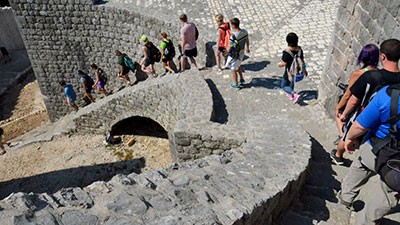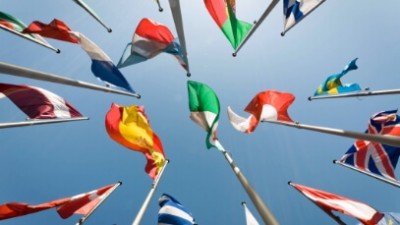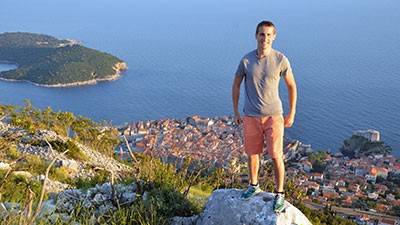Living in Dubrovnik
- RIT/
- RIT Study Abroad/
- Get Started/
- Study Abroad at an RIT Global Campus/
- Study Abroad at RIT Croatia - Dubrovnik/
- Living in Dubrovnik
Housing
Students will either live in shared apartments in Dubrovnik or at the Studentski dom student dorm in Dubrovnik.
Apartments
The RIT Croatia staff works with local landlords in Dubrovnik to secure apartments. Apartments are fully furnished and are typically a short public transportation ride to RIT Croatia, or within a 30-minute walk. Apartments will have kitchens for meal preparation, and grocery stores are easily accessible for food shopping. There are many restaurants in Dubrovnik, and food delivery services like Glovo or Wolt are also available.
Please note that students on this program may be placed in mixed-gender apartment-style housing in which bedrooms are separated by gender, but the apartment itself has students of the opposite gender.
Dorm
The Studentski dorm was built in 2020 and is a 7-minute public transportation ride or a 25-minute walk to campus. Students stay in shared dorm rooms (two students per room). Rooms are furnished, and each room has two beds, a workstation with shelves for each student, a wardrobe space, a mini-refrigerator, and a bathroom. Each floor of the dorm has a shared kitchen and study space. A fitness center and restaurant are also available on-site. Bedding and towels are provided, and paid laundry facilities are on site. The dorm building and floors are co-ed.
The dorm entrance reception area is staffed at all times (24/7). After 10:00 pm, all students entering the building must show their ID. Students access their rooms with a personal key card. There are also several security cameras outside of the dorm property. Students will receive dorm policies/rules at their Croatia In-Country Orientation.
The dorm restaurant on the first floor offers breakfast, lunch, or dinner, which are available for purchase. The restaurant offers daily main dish specials, a salad bar, a soup station, beverages, and desserts. A grocery store is a short walk from the dorm, and you can visit other nearby cafes and restaurants.
Food and Dining
Places to buy food include smaller mini-markets, supermarkets, fresh green markets and local restaurants. Local cuisine is influenced by Italian (especially around the coast), German, and French cuisine (continental Croatia). There are some traces of Turkish or Greek influences, particularly in fast food.
The tap water in Croatia is drinkable and of very high quality. The water contains a high mineral content, important to know when you use a dishwasher or an iron.
Please note that if excessive rain falls for a couple of days in Dubrovnik, the water might change color, and it is only advisable to drink it once it clears. This happens due to porous soil, which contaminates the water when there is extensive rain.
You can cook at home, which is the most affordable option. You can also go to restaurants like Mea Culpa (pizza), Taj Mahal (traditional Bosnian dishes), Peskarija (seafood), and Toni (pasta). All of these are located in the Old Town, and you can get a meal with a drink for less than $15. Students usually eat at student restaurants (“menza”), where Croatian students have subsidized prices.
How can you avoid seafood? If seafood is present in a meal, the fact is usually stated with pride on the menu. Fish is called “riba” (reebah) in Croatian, and clams are called “školjke” (shcolke). To make sure, always ask the waiter.
Almost all grocery stores are open from 7:00 am-9:00 pm. You can’t buy food after 9:00 pm except in restaurants. Grocery selection is limited compared to the U.S.
In Croatian restaurants, there is no doggy bag concept; portions are smaller compared to the U.S. There are not a lot of fast food options, but there are a lot of bakeries where you can buy snacks, pastries, etc. There are many pizza places, and some restaurants deliver. Popular food delivery services in Croatia include Glovo and Wolt.
Excursions
Students in Dubrovnik will participate in excursions as part of their study abroad experience, which are included in the cost of the program fee. More details on the excursions offered will be made available once you arrive in Croatia. Excursions may include:
Montenegro Day Trip: Visiting Montenegro will introduce you to the beauty of small and picturesque towns, mountains, and a spectacular Adriatic coastline.
A day trip to Cavat and Konavle: Cavtat is a town on the Adriatic Coast of Croatia, southeast of Dubrovnik, known for its beaches. Konavle is a town in southern Croatia with picturesque valleys full of vineyards and olive groves.
A weekend trip to Split and Krka Falls: Split is a quaint town on Croatia’s Dalmatian Coast that is known for its beaches and the fortress-like complex at its center. Krka Falls features a series of 7 waterfalls in Krka National Park.
In addition to planned excursions, students in Dubrovnik also have the opportunity to participate in activities such as beach barbeques, community service, guest lectures, and other university events.
Things to do Around Town
RIT Croatia in Dubrovnik is a short walk from Old Town, one of the world’s finest and most perfectly preserved medieval cities, and a UNESCO World Heritage site with narrow streets perfect for historical sightseeing and abundant markets, cafes, and restaurants. Old Town is by all means the most interesting and the most attractive part of Dubrovnik. Walking into Old Town, you will find yourself on the most famous and beloved Dubrovnik city street, Stradun. With its numerous souvenir shops, galleries, coffee bars, and restaurants, Stradun is never quiet.
If you wish to explore more of the city, you can walk or take a bus/taxi to many points of interest that students typically visit:
Ancient City Walls: A stay in Dubrovnik is not complete without a visit to the ancient city walls with stunning views of the city and sea.
Fort Lovrijenac (St. Lawrence Fortress): Often called "Dubrovnik's Gibraltar", this fortress outside the western wall of the city is a popular attraction and a filming location for many scenes in Game of Thrones.
Dubrovnik Cable Car: The most beautiful view of Dubrovnik and surrounding islands is a short cable car ride to Mount Srdj. While on Srdj, you can also visit the Imperial Fortress, which houses the Museum of the Croatian War of Independence.
Island of Lokrum: A short ferry ride from the old town makes the island an ideal day trip, with abundant wildlife, swimming, hiking, and the ruins of the Benedictine Monastery.
Banje Beach: The city beach, Banje, is a short walk from the Ploče Gate. The sand tends to be pebbly but has showers, jet skis, and inflatables. Explore other nearby beaches, including Sveti Jakov, Lapad, and Copacabana.
There are many tour operators that offer tours that will introduce you to all that Dubrovnik has to offer, including walking tours, sightseeing tours, boat tours, kayaking, nature tours, historical/heritage tours, and day trips. Ask your RIT Dubrovnik staff for suggested tour operators.
A visit to some of the Adriatic islands off the coast of Dubrovnik, including Korčula, Mljet, the Elaphiti Islands, and the Pelješac Peninsula, is worth a visit.
Student Life
Most RIT Croatia students are involved in extracurricular activities, ranging from recreation to clubs and volunteering in community service projects. Trips to museums, local attractions, and concerts are also available.
RIT Croatia’s student government has a wide variety of clubs to meet the demands of its students. RIT Croatia has a number of active clubs, including the Business Environment Exploration Club, Investment Club, E-Sports Club, Robotics Club, and Volunteer Club.
RIT Croatia always organizes activities and fun campus events like movie nights, game nights, stress breakers, and sports days.
Local Culture
Locals in your host country will likely be understanding and will not take offense at social blunders, provided they arise from ignorance rather than malice. However, you will be far more comfortable and welcome if you acquaint yourself with local ways of doing things. It’s important to remember that as a guest in your host country, you must adapt to the customs and social behavior of the region – not the other way around.
Socializing
- Most Croatians speak some English, but trying to learn some Croatian words and phrases is much appreciated.
- Croatia takes pride in its coffee culture; many meet friends or colleagues over leisurely cups of coffee. Coffee to go is rare. Some cafes might offer coffee only and no food (however, bringing your own snack to enjoy with your coffee is acceptable).
- Coffee shops are prevalent however, you will not find commercial coffee chains.
- Be aware that some places in Croatia may only accept cash, particularly in cafés, bars, and small restaurants.
- The concept of siesta is a part of the elder generation’s daily routine. Between 2 pm and 5 pm, avoid making too much noise or phoning a local, as this is national naptime, particularly on the coast. Although rare today, don’t be surprised if some stores close in the afternoon.
- It is common for Croatians to speak loudly and be animated in conversations. This is assumed to reflect passion and expressiveness rather than anger.
- Generally, Croatians do not touch each other when they speak, especially when encountering someone for the first time. Light touching (such as a tap on the shoulder) can be common when a relationship has been established. Public displays of affection, such as kissing and hugging, are acceptable.
- Croatians tend to be extremely punctual and expect others to be on time. That being said, punctuality is more important in a professional setting than social ones. Friends will forgive tardiness so long as it is not a recurring behavior.
- Putting your feet up on couches in public spaces is considered rude and inconsiderate, especially at tables and the back of other people's seats. It is even more unacceptable to put your feet up while wearing shoes. It is a good form to keep your feet off any surface other than the floor or ground.
Dining/Meals
- Table manners are relatively casual as people like to eat and chat at meal times.
- With most Croatians being Catholic, it’s customary for some to say prayer or thanks before a meal. So, wait a little to be sure you’re not digging in too early.
- Croatian hospitality requires the host to ensure you are full and happy when eating at a friend or relative’s house. There is an emphasis on family, friends, and food. Offering drinks, pre-meal snacks, a meal, a second helping, even a third helping, cake, coffee, and more drinks to guests is a must. You should not decline as a guest, as saying no would be considered rude. Instead, take a small first serving, allowing you to accept a second helping.
- It is considered rude to place one’s hands below the table. Instead, Croatians tend to keep their hands above the table.
- In Croatia, lunch is considered the day's main meal and may consist of multiple courses.
- If eating in a restaurant or cafe and your Croatian counterpart insists on paying, let them pay. However, don’t take advantage of their hospitality; make sure you pick up the tab sometimes as well.
- Tipping your server in a restaurant is standard practice – 5%-10% on your bill is typical. There’s no rule that you have to tip, but it’s considered good etiquette if you do. If you pay with a credit card, leave the tip in cash.
- When purchasing food items, remember that the price/quantity ratios are much different than in the U.S. Food prices may be similar, but the package size may be smaller.
Safety
- Relations between the U.S. and Croatia are very strong. The U.S. established diplomatic relations with Croatia in 1992.
- Traveling in Croatia is generally safe and is highly rated for its safety index. Visitors of Croatia seldom face any severe threat during their stay in the country; however, pickpocketing, petty thefts, bag snatching, and ATM scams do happen, so it is important to be aware of your surroundings.
Religion
- The constitution of Croatia defines all religious communities as equal by law and separate from the state, and the country has no official religion.
- The Dubrovnik community is very inclusive and receptive towards various ethnicities and religions. The largest religion in Croatia is Catholic. More than 80 churches are scattered around Dubrovnik, the majority of them within the Old Town. Dubrovnik also has an Orthodox Church, synagogue, and Islamic Center.
Dress/Clothing
- Wearing swimwear (with no cover-up) around town or walking around shirtless may incur fines.
- Bring one set of business clothes for in-class presentations, Career Education Day, and other slightly more formal events.
Meeting and Greeting
- Greetings on initial meetings will be formal and reserved.
- In some cases, men and women will kiss each other on each cheek, which is a sign of a good friendship. Wait until the Croatian initiates this form of greeting.
- Address people with their titles plus surnames. Only close friends and family members tend to use first names. Never jump to first name terms without being invited to.
Gestures
- Croatians usually only point their index finger when arguing or intending to belittle someone. If someone needs to point towards a person or object, politely use the whole hand or nod with one’s head.
- Bending the middle and ring fingers with the index and pinkie fingers extended is rude.
Topics To Avoid
- Comparisons to anything Serbian can still be a touchy subject for some.
- Do not refer to Croatia as Yugoslavia or to a Croatian as ‘Yugoslavian’. As a nation, Croatia has endured many difficulties asserting its independent identity from surrounding countries and cultures.
- Discussing national politics with Croatians can be sensitive because of widespread nationalistic views. Discussing other ethnicities of Yugoslavia, as well as religious issues in casual conversation, are considered taboo.
History
Croatia has a long and eventful history. Hungary, Venice, Napoleon, and Austria alternately ruled Croatia for centuries. After WWI, Croatia became part of Yugoslavia along with Serbia, Slovenia, Bosnia, Montenegro and Macedonia. Croatia gained independence from Yugoslavia in 1991 and was immediately thrust into the devastating Bosnian War from 1991-1995. Post-war recovery led to improved economic conditions, the rebuilding of infrastructure, and acceptance into the European Union. Today, Croatia is a vibrant country with a bustling economy and natural beauty. It is also known for being a popular tourist destination.
Weather
The climate of Croatia is classified as a warm, temperate Mediterranean climate with dry, warm summers and moderate, wet winters.
The summer months of July and August are typically hot and ideal water temperatures for swimming.
Winters are cooler and wetter, though still pleasant enough. Interior parts of the country may experience snow during the colder months.
Average temperatures:
Summer
Dubrovnik 70-80 Degrees
Zagreb 65-82 Degrees
Winter
Dubrovnik 40-50 degrees
Zagreb 32-47 degrees





